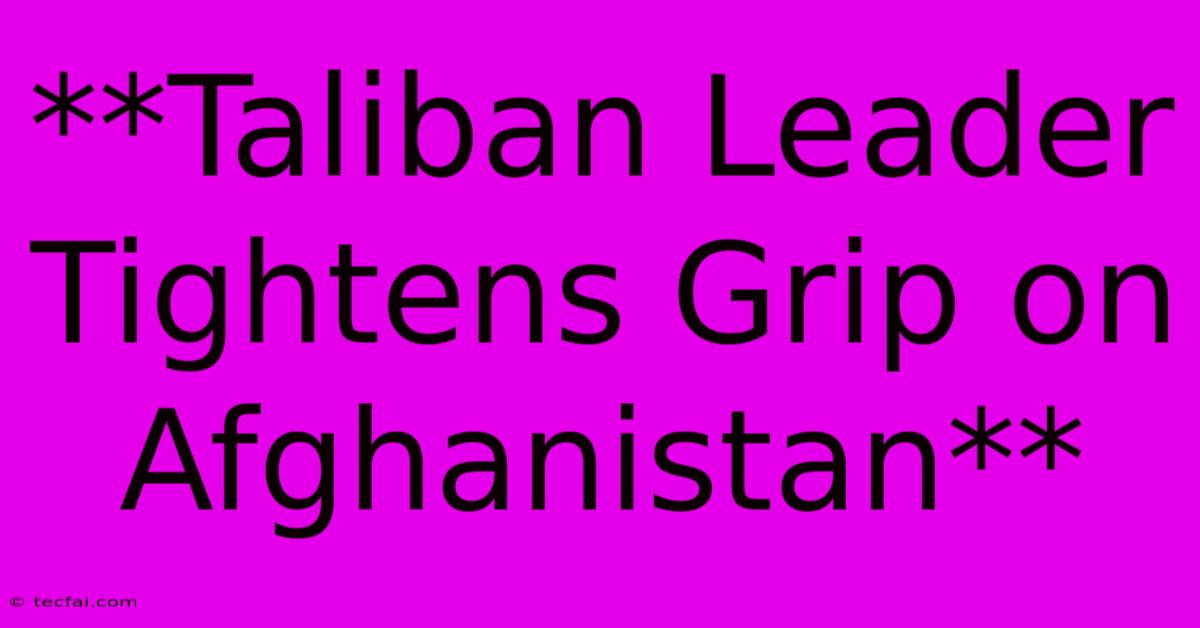**Taliban Leader Tightens Grip On Afghanistan**

Discover more detailed and exciting information on our website. Click the link below to start your adventure: Visit Best Website tecfai.com. Don't miss out!
Table of Contents
Taliban Leader Tightens Grip on Afghanistan: A Look at the New Reality
The Taliban's return to power in Afghanistan in August 2021 marked a dramatic shift in the country's political landscape. Since then, the group has been steadily consolidating its control, implementing policies that have raised concerns both within Afghanistan and internationally. This article will delve into the key aspects of the Taliban's current rule, examining their leadership structure, policies, and the challenges they face.
The Taliban's Leadership: A Complex Structure
The Taliban's leadership is a complex web of individuals and factions, with Hibatullah Akhundzada serving as the supreme leader. Akhundzada, a religious scholar known for his strict interpretation of Islamic law, operates largely in the shadows. The day-to-day running of the government falls to the "Acting Prime Minister" Mullah Mohammad Hassan Akhund, a veteran figure in the Taliban leadership. However, the Taliban leadership is not a monolithic entity. It comprises various factions, each with its own agendas and interests. This internal dynamic can lead to conflicts and power struggles that impact the stability of the regime.
The New Reality: Policies and Challenges
The Taliban's rule has ushered in a new reality for Afghanistan, marked by both promises and concerns. The group has implemented a range of policies, some of which have been met with international criticism. Here are some key areas:
Women's Rights: One of the most contentious issues has been the restriction of women's rights. The Taliban has re-imposed severe restrictions on women's education and employment, banning girls from secondary schools and barring women from working in many government positions. This has led to widespread condemnation from the international community and fueled concerns about the future of Afghan women.
Human Rights: Beyond women's rights, the Taliban's record on human rights is also under scrutiny. Reports of arbitrary arrests, torture, and extrajudicial killings have emerged, raising concerns about the rule of law and the safety of civilians.
Economic Crisis: Afghanistan faces a dire economic crisis exacerbated by international sanctions and the withdrawal of foreign aid. The Taliban has struggled to restore stability and revive the economy, resulting in widespread poverty and unemployment.
Foreign Relations: The Taliban is seeking international recognition and aid, but their relationship with the world remains strained. While some countries have established diplomatic channels with the Taliban, others continue to withhold recognition, citing concerns about human rights violations and the Taliban's association with terrorism.
The Road Ahead: Uncertainty and Challenges
The future of Afghanistan under Taliban rule remains uncertain. The group faces significant challenges, including managing the complex political landscape, reviving the economy, and navigating the international community's skepticism. The Taliban's success in addressing these challenges will determine the future of Afghanistan and its people.
The Taliban's tightening grip on Afghanistan presents a complex and evolving situation. The implications of their rule will continue to unfold, requiring continued vigilance and engagement from the international community. The road ahead for Afghanistan is fraught with uncertainty, and the outcome will depend on the choices made by the Taliban and the international community alike.

Thank you for visiting our website wich cover about **Taliban Leader Tightens Grip On Afghanistan**. We hope the information provided has been useful to you. Feel free to contact us if you have any questions or need further assistance. See you next time and dont miss to bookmark.
Featured Posts
-
Palm Bay Residents Hear Rotc Training
Nov 14, 2024
-
Rare Earth Magnet Supply Secured For Viridion Joint Venture In Brazil
Nov 14, 2024
-
T20 Series India Defeats South Africa By 11 Runs
Nov 14, 2024
-
Remembering Name Fashion Icon
Nov 14, 2024
-
Trumps Gaetz Ag Choice Faces Backlash
Nov 14, 2024
